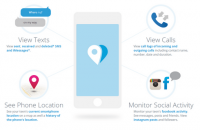-
Social media helps build a sense of community in the aftermath of disaster
After natural disasters communities rely heavily on local governments to provide the necessary resources and information to respond to such disasters, but these approaches are not well equipped to meeting individual needs. As a complement to traditional methods, social media can provide a more personalized resource as well as fostering a sense of community in response to the crisis.
-
-
Researchers look for ways to keep cars safe from hacking

In 2015, two researchers remotely hacked a Jeep Cherokee being driven by a reporter who documented how the researchers controlled everything from the car’s radio and media console to its brakes and steering. For computer scientists at the University of Arkansas at Little Rock, the exercise demonstrated how vulnerable smart cars with GPS, Bluetooth, and Internet connections are to cyberattacks – and they decided to do something about it.
-
-
After the NSA hack: Cybersecurity in an even more vulnerable world

It is looking increasingly likely that computer hackers have in fact successfully attacked what had been the pinnacle of cybersecurity – the U.S. National Security Agency (NSA). Cyberweapons and their capabilities are becoming an increasing part of international relations, forming part of foreign policy decisions and even sparking what has been called a “cyber arms race.” The cyberattack on the NSA’s – specifically, the attack on the Equation Group, the NSA’s spying element – may be part of this global interplay. The attack is also further proof of the cybersecurity industry’s axiom about the highly asymmetric probabilities of successful attack and successful defense: Attackers need to succeed only once; defenders have to be perfect every time. As sophisticated as NSA’s highly secure network is, the agency cannot ever fully protect itself from cyberattackers.
-
-
People disregard security warnings on computers because these warnings come at bad times

Software developers listen up: if you want people to pay attention to your security warnings on their computers or mobile devices, you need to make them pop up at better times. A new study finds the status quo of warning messages appearing haphazardly — while people are typing, watching a video, uploading files, etc. — results in up to 90 percent of users disregarding them.
-
-
U.S. social media strategy can use Twitter more effectively to weaken ISIS influence

Opponents of ISIS and Syria are six times greater in number on Twitter than ISIS supporters, but those sympathetic to the group are more active on the social media platform, according to a new RAND Corporation study. The researchers, analyzing more than twenty-three million tweets posted in Arabic over a 10-month period, found that, on average, supporters of ISIS produce 50 percent more tweets than opponents on a typical day, although there is evidence that ISIS opponents are increasing their activity.
-
-
DHS S&T awards $1.3 million to small businesses for cybersecurity R&D
DHS S&T has awarded $1.3 million to thirteen small businesses for the development of new cyber security technology. Each business was awarded approximately $100,000 in preliminary funding through the DHS S&T Small Business Innovation Research (SBIR) program. The SBIR proposal solicitation, released in December 2015, included four topics developed by Cyber Security Division program managers.
-
-
Germany to search refugees' phones to establish identity, spot suspicious connections

German interior minister Thomas de Maizière will next week announce a new German anti-terror steps, which, among other things, will require refugees and asylum-seekers arriving in Germany without a passport to surrender their smartphones – and all the passwords and security pin numbers associated with the phones – so German security agencies could check the owners’ social media accounts. The security services in Denmark, Norway, Sweden, and the Netherlands already routinely examine refugees’ mobile phones to establish a refugee’s identity.
-
-
New hacking technique stealthily changes memory of virtual servers
For the first time ever a team of Dutch hacking experts managed to alter the memory of virtual machines in the cloud without a software bug, using a new attack technique. With this technique an attacker can crack the keys of secured virtual machines or install malware without it being noticed.
-
-
Sophisticated espionage platform covertly extracts encrypted government communications
Kaspersky Lab announced the other day that its researchers have discovered what they described as a “nation-state threat actor” — named ProjectSauron — who was targeting state organizations. “The cost, complexity, persistence, and ultimate goal of the operation, stealing confidential and secret information from state-sensitive organizations, suggest the involvement or support of a nation state,” Kaspersky Lab says. ProjectSauron “gives the impression of being an experienced and traditional actor who has put considerable effort into learning from other extremely advanced actors,” and “ adopting some of their most innovative techniques and improving on their tactics in order to remain undiscovered.”
-
-
Android apps can secretly track users’ whereabouts

Three years ago, the FTC dimmed hopes for the Brightest Flashlight app for Android, slapping its developer with charges of consumer deception, because the app was transmitting users’ locations and device IDs to third parties without telling the users or getting their permission. Permissions, though, are only a small part of the Android-app privacy story. New research shows that Android apps can be manipulated to reach inside your mobile phone to track your whereabouts and traffic patterns, all without your knowledge or consent.
-
-
Serious security threat to many Internet users identified
Researchers have identified a weakness in the Transmission Control Protocol (TCP) of all Linux operating systems since late 2012 that enables attackers to hijack users’ Internet communications completely remotely. Such a weakness could be used to launch targeted attacks that track users’ online activity, forcibly terminate a communication, hijack a conversation between hosts, or degrade the privacy guarantee by anonymity networks such as Tor.
-
-
If two countries waged cyber war on each another, here’s what to expect
Imagine you woke up to discover a massive cyberattack on your country. All government data has been destroyed, taking out healthcare records, birth certificates, social care records and so much more. The transport system isn’t working, traffic lights are blank, immigration is in chaos, and all tax records have disappeared. When countries declare war on one another in future, this sort of disaster might be the opportunity the enemy is looking for. Given the current level of international tension and the potential damage from a major cyberattack, this is an area that all countries need to take very seriously. Better to do it now rather than waiting until one country pays the price. For better and worse, the world has never been so connected.
-
-
Dominating cyberspace through advanced network security, capabilities
As the cyber domain continues to expand, the U.S. military and government have begun to place greater emphasis on cyber operations. As cyber operations have increased, the need for enhanced monitoring, security, and access technologies to promote advanced cyberspace operations have increased as well. The Defense Strategies Institute (DSI) has designed a forum in order to promote conversation that seeks to advance network security and cyber capabilities.
-
-
Fake ATM spotted by DefCon attendees

One of the curious features at the DefCon 24 even in Las Vegas is a fake ATM in the show’s venue. The fake ATM kiosk was placed in the lobby of the Riviera Hotel Casino sometime before the conference opened. As is appropriate at an event of sharp-eyed cybersecurity specialists and white hackers, the scam was uncovered when people noticed something wrong with the machine.
-
-
Hacking hotel magnetic-stripe based key cards is easy

If you travel a lot for business or pleasure, and stay at hotels at the places you visit, you may not like the information presented at the DefCon 24 event in Las Vegas. A security expert will tell the attendees that the magnetic-stripe based key cards guests are given to enter their rooms have major weaknesses which could allow an attacker to modify these cards to enter guests rooms.
-
More headlines
The long view
Researchers Develop AI Agent That Solves Cybersecurity Challenges Autonomously
New framework called EnIGMA demonstrates improved performance in automated vulnerability detection using interactive tools.
